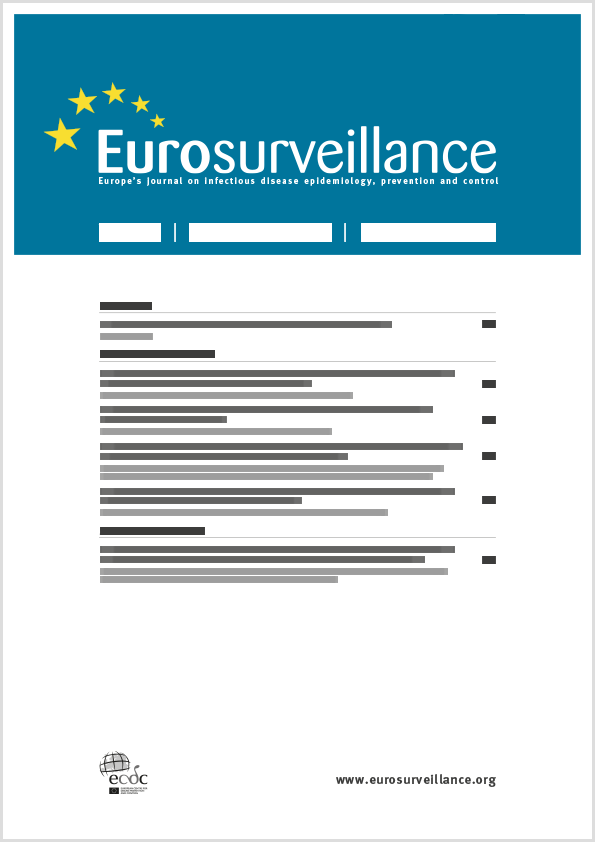- Home
- Eurosurveillance
- Previous Issues
- Volume 25, Issue 24, 18/Jun/2020
Eurosurveillance - Volume 25, Issue 24, 18 June 2020
Volume 25, Issue 24, 2020
- Rapid communication
-
-
-
Multicentre comparison of quantitative PCR-based assays to detect SARS-CoV-2, Germany, March 2020
Maximilian Muenchhoff , Helga Mairhofer , Hans Nitschko , Natascha Grzimek-Koschewa , Dieter Hoffmann , Annemarie Berger , Holger Rabenau , Marek Widera , Nikolaus Ackermann , Regina Konrad , Sabine Zange , Alexander Graf , Stefan Krebs , Helmut Blum , Andreas Sing , Bernhard Liebl , Roman Wölfel , Sandra Ciesek , Christian Drosten , Ulrike Protzer , Stephan Boehm and Oliver T KepplerMore LessContainment strategies and clinical management of coronavirus disease (COVID-19) patients during the current pandemic depend on reliable diagnostic PCR assays for the severe acute respiratory syndrome coronavirus 2 (SARS-CoV-2). Here, we compare 11 different RT-PCR test systems used in seven diagnostic laboratories in Germany in March 2020. While most assays performed well, we identified detection problems in a commonly used assay that may have resulted in false-negative test results during the first weeks of the pandemic.
-
-
-
Prevalence of SARS-CoV-2 specific neutralising antibodies in blood donors from the Lodi Red Zone in Lombardy, Italy, as at 06 April 2020
More LessWe evaluated SARS-CoV-2 RNA and neutralising antibodies in blood donors (BD) residing in the Lodi Red Zone, Italy. Of 390 BDs recruited after 20 February 2020 − when the first COVID-19 case in Lombardy was identified, 91 (23%) aged 19–70 years were antibody positive. Viral RNA was detected in an additional 17 (4.3%) BDs, yielding ca 28% (108/390) with evidence of virus exposure. Five stored samples collected as early as 12 February were seropositive.
-
- Top
-
- Outbreaks
-
-
-
A common source for a trichinellosis outbreak reported in France and Serbia in 2017
More LessTrichinellosis is a rare parasitic zoonosis in the European Union. Meat from backyard pigs was the common source for a trichinellosis outbreak caused by Trichinella spiralis, which occurred in France and Serbia in the beginning of 2017. An epidemiological study was conducted in France and Serbia to determine the extent of the outbreak, to identify its source and to implement control measures. Three cases were exposed in Serbia and brought back to France pork delicatessen which they shared with relatives and friends. Around 47 individuals were exposed to the parasitised meat in France and Serbia and 20 cases of trichinellosis were reported (nine in France and 11 in Serbia). Nine of them were female. The diagnosis was delayed, in part because the parasitosis was not known by most physicians, which led to complications in the French cases such as facial paralysis and pulmonary embolism. Health alerts and survey networks are indispensable at a European level to control the disease.
-
- Top
-
- Author's correction
-
Volumes & issues
-
Volume 30 (2025)
-
Volume 29 (2024)
-
Volume 28 (2023)
-
Volume 27 (2022)
-
Volume 26 (2021)
-
Volume 25 (2020)
-
Volume 24 (2019)
-
Volume 23 (2018)
-
Volume 22 (2017)
-
Volume 21 (2016)
-
Volume 20 (2015)
-
Volume 19 (2014)
-
Volume 18 (2013)
-
Volume 17 (2012)
-
Volume 16 (2011)
-
Volume 15 (2010)
-
Volume 14 (2009)
-
Volume 13 (2008)
-
Volume 12 (2007)
-
Volume 11 (2006)
-
Volume 10 (2005)
-
Volume 9 (2004)
-
Volume 8 (2003)
-
Volume 7 (2002)
-
Volume 6 (2001)
-
Volume 5 (2000)
-
Volume 4 (1999)
-
Volume 3 (1998)
-
Volume 2 (1997)
-
Volume 1 (1996)
-
Volume 0 (1995)
Most Read This Month

-
-
Detection of 2019 novel coronavirus (2019-nCoV) by real-time RT-PCR
Victor M Corman , Olfert Landt , Marco Kaiser , Richard Molenkamp , Adam Meijer , Daniel KW Chu , Tobias Bleicker , Sebastian Brünink , Julia Schneider , Marie Luisa Schmidt , Daphne GJC Mulders , Bart L Haagmans , Bas van der Veer , Sharon van den Brink , Lisa Wijsman , Gabriel Goderski , Jean-Louis Romette , Joanna Ellis , Maria Zambon , Malik Peiris , Herman Goossens , Chantal Reusken , Marion PG Koopmans and Christian Drosten
-
- More Less


